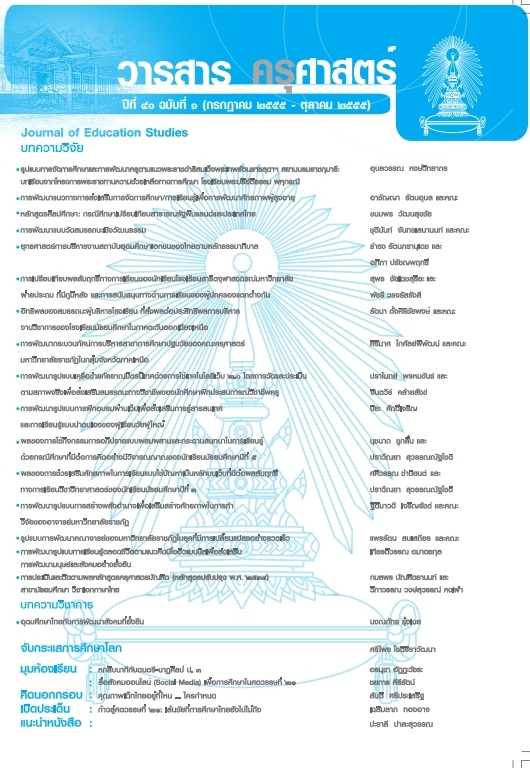การพัฒนาแนวทางการส่งเสริมการจัดการศึกษา/การเรียนรู้ เพื่อการพัฒนาศักยภาพผู้สูงอายุ
Abstract
การวิจัยเรื่อง “การพัฒนาแนวทางการส่งเสริมการจัดการศึกษา/การเรียนรู้เพื่อการพัฒนาศักยภาพผู้สูงอายุ” ใช้ระเบียบวิธีวิจัยแบบผสานวิธี มีวัตถุประสงค์ในการวิจัย ๑) เพื่อศึกษาสภาพการจัดการศึกษา/การเรียนรู้เพื่อการพัฒนาศักยภาพผู้สูงอายุในประเทศและต่างประเทศที่ประสบความสำเร็จ๒) เพื่อศึกษาสภาพ ปัญหา และความต้องการการจัดการศึกษา/การเรียนรู้เพื่อการพัฒนาศักยภาพผู้สูงอายุในประเทศไทย ๓) เพื่อจัดทำรูปแบบและแนวทางการจัดการศึกษา/การเรียนรู้เพื่อการพัฒนาศักยภาพผู้สูงอายุ กลุ่มตัวอย่างคือ ผู้สูงอายุ ญาติที่อยู่ร่วมกับผู้สูงอายุ บุคลากรทางการศึกษา และผู้มีส่วนเกี่ยวข้องในท้องถิ่น ที่อาศัยใน ๕ ภูมิภาค ได้แก่ ภาคกลาง ภาคเหนือ ภาคตะวันออกเฉียงเหนือภาคตะวันออก และภาคใต้ การดำเนินการวิจัยแบ่งออกเป็น ๒ ขั้นตอน คือ ๑) ขั้นตอนการวิจัย เป็นการศึกษาเอกสาร การศึกษากรณีตัวอย่างที่ดี และการสำรวจสภาพ ปัญหา และความต้องการการส่งเสริมการจัดการศึกษา/การเรียนรู้ของผู้สูงอายุ ญาติ บุคลากรทางการศึกษา และผู้มีส่วนเกี่ยวข้องในท้องถิ่น๒) ขั้นตอนการพัฒนา เป็นการพัฒนารูปแบบและแนวทางการส่งเสริมการจัดการศึกษา/การเรียนรู้เพื่อการพัฒนาศักยภาพผู้สูงอายุ
ผลการวิจัยสรุปได้ ดังนี้ ๑) ผลการวิเคราะห์และสังเคราะห์ข้อมูลการให้บริการการศึกษา/การเรียนรู้เพื่อการพัฒนาศักยภาพผู้สูงอายุของประเทศไทยและต่างประเทศ และการเปรียบเทียบกับการจัดการศึกษาเพื่อการพัฒนาศักยภาพผู้สูงอายุของประเทศไทย พบว่า กรณีศึกษาที่ดีของประเทศไทยเป็นการจัดกิจกรรมที่ให้ความสำคัญกับผู้สูงอายุ ครอบครัว และชุมชนโดยรวม โดยบูรณาการกิจกรรมการเรียนรู้และกิจกรรมการเตรียมความพร้อม เพื่อให้ผู้สูงอายุมีคุณภาพชีวิตที่ดี อยู่ร่วมกับผู้อื่นในสังคมได้อย่างมีความสุขสำหรับในต่างประเทศ พบว่า มีการดำเนินกิจกรรมอย่างเป็นระบบในการหาความต้องการ การวางแผน การจัดทำโครงการ การดำเนินการและการประเมินผล โดยให้ผู้ทรงคุณวุฒิเข้ามามีส่วนร่วมในการวางแผนและจัดกิจกรรม ตลอดจนมีการประเมินผลกิจกรรมการเรียนรู้ ๒) ผลการวิเคราะห์ข้อมูลปัญหาและความต้องการการส่งเสริมการจัดการศึกษา/การเรียนรู้ สำหรับผู้สูงอายุ พบว่า ผู้สูงอายุมีปัญหาสุขภาพทางกายมากที่สุด สำหรับความต้องการการส่งเสริมการจัดการศึกษา/เรียนรู้สำหรับผู้สูงอายุด้านรูปแบบการจัดการเรียนการสอน/กิจกรรมการเรียนรู้ พบว่า มีความต้องการด้านความเชี่ยวชาญของวิทยากร/ผู้สอนมากที่สุด เมื่อเปรียบเทียบความต้องการ การส่งเสริมการจัดการศึกษา/การเรียนรู้เพื่อการพัฒนาศักยภาพสำหรับผู้สูงอายุ ระหว่างบุคลากรทางการศึกษา และหน่วยงานที่เกี่ยวข้อง และผู้มีส่วนเกี่ยวข้องในท้องถิ่น พบว่า มีความต้องการแตกต่างกันอย่างมีนัยสำคัญทางสถิติที่ระดับ .๑๐ ๓) รูปแบบและแนวทางการส่งเสริมการจัดการศึกษา/การเรียนรู้เพื่อการพัฒนาศักยภาพผู้สูงอายุ พบว่า แบ่งออกเป็น ๕ รูปแบบ ประกอบด้วย รูปแบบมหาวิทยาลัยวัยที่สาม รูปแบบศูนย์เอนกประสงค์สำหรับผู้สูงอายุในชุมชน รูปแบบเมือง/ชุมชนสำหรับผู้สูงอายุ รูปแบบชมรมผู้สูงอายุ/สโมสรผู้สูงอายุ และรูปแบบการรวมกลุ่มของผู้สูงอายุตามอัธยาศัย และแนวทางการส่งเสริมการจัดการศึกษา/การเรียนรู้เพื่อการพัฒนาศักยภาพผู้สูงอายุ ประกอบด้วย ๔ หลักสำคัญ คือ (๑) การกำหนดเนื้อหา/กิจกรรมการเรียนรู้ (๒) การเชื่อมโยงเครือข่ายเพื่อส่งเสริมกิจกรรมการศึกษา/การเรียนรู้(๓) การจัดสภาพแวดล้อมการเรียนรู้/สื่อการเรียนรู้ และ (๔) การวิจัยและพัฒนา
The study explored the development of the supportive guidelines in education/learning management for enhancing the competencies of older adults in Thailand. Mixedmethodology with multiple applications was applied as a research design for the study.The major purposes were to (1) study the stages in educational/learning managementfor enhancing older Thai adults’ competencies; (2) study the stages, problems, and needsin educational/learning management for enhancing older Thai adults’ competencies, and(3) develop and propose the educational/learning management models and guidelines forenhancing the competencies of older adults in Thailand. There were two main researchprocedures used as follows: 1) Research Process: the process was divided into 4 stagesincluding Stage 1: Reviewing of literatures; Stage 2: the studying of a variety of the bestpractices both in Thailand and foreign countries; Stage 3: analyzing and synthesizing ofthe collected data related to education/learning services and the older adults’ competenciesdevelopment in foreign countries in comparison to the reviewed data gained from Thaicontexts ; and Stage 4: surveying of the perspectives of (1) older adults, (2) their families,cousins, and relatives, (3) related educational personnel and staff, and (4) related localauthorities. 2) Development Process: the process was divided into three main stages:Stage 1: drafting the developed model and guidelines; Stage 2: monitoring the validityand properness of the developed model and educational/learning guidelines and policyrecommendations; and Stage 3: Analyzing data and the presentation.
The research findings were divided into 3 main parts based on the researchobjectives as follows: 1) The results of the data analysis and synthesize in education/ learningservices for enhancing older adults’ competencies: Best practices: The data revealed thatmost of the Thailand best practices implemented their learning activities and services based on the Thai way of life; involved several groups such as older adults, family, and communitymembers; applied integrated lifelong learning activities including formal education; non-formaleducation, and informal education, and implemented other learning preparation programs forolder adults which focused on the improvement of quality of life. Most of the best practicesapplied systematic implementation of the need analysis, programs and activities planning,program implementation, and the evaluation. Each process involved experts’ collaboration.2) The results of the data analysis problems and needs in education/learningmanagement for enhancement of Thai older adults’ competencies toward differentperspectives: According to the survey, the results showed that Health was the problemwith the highest score in each area of need, including needs in education/learningmanagement: Management; the needs for older adults themselves: Health was reported;the needs for organizing learning activities: Qualified Teachers; and the needs in overallmanagement: The results indicated that there was significant difference at .10 of theneeds in older adults themselves. However, if considering each area of need, the resultsshowed that there was significant difference at .10 of the needs in spare time betweenolder adults and their families, cousins, and relatives. However, considering each item, theresults showed that there was significant difference at .10 of the needs in learning mediaand materials, and high technology learning equipment between older adults and relatededucational personnel, staff and local authorities. 3) The results of the development anda proposal of educational/learning management models and guidelines for enhancing thecompetencies of older adults in Thailand: The educational/learning management modelsfor enhancing the competencies of older adults in Thailand, could be divided into 5 mainmodels: (1) The University of the Third Age: U3As; (2) Community Multipurpose ServiceCenter; (3) Senior Community; (4) Senior Club; and (5) Informal Senior Group. Further,the educational/learning management guidelines for enhancing the competencies of olderadults in Thailand: Consisted of 4 major guidelines and consisted of key concepts andaction plans as follows: (1) designing of curriculums/contents and Activities; (2) connectingof social networks for educational/learning enhancement; (3) the setting of a learningclimate and environment; and resources; and (4) developing the research and development.




